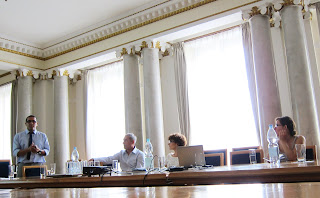 |
| Photograph by Yuliya Zemlytska |
If someone held a competition for the title of “group most disliked by the society”, Romani people and LGBTQs would most likely share the first place. The prize they get for it, however, is discrimination on every level of social existence. Today HIA fellows explored Polish realities of both of these groups.
We plunge into the day with a visit to the OSCE/ODIHR office, where Roma officers Dr. Andrzej Mirga and Mr. Stanislav Daniel introduce us to the work of Contact Point for Roma and Sinti Issues (CPRSI). The main role of the Contact Point is to assist States with implementation of the Action Plan on Improving the Situation of Roma and Sinti within OSCE Area. The Contact Point focuses mainly on human right violations and discrimination of Roma and works directly with governments and Roma communities. In practice it implies such activities as site visits, carrying out educational and prevention campaigns, organizing trainings, seminars and conferences, funding and support of on-spot projects by other actors (NGOs, IOs, etc). It is remarkable that Contact Point is run according to the principle “For Roma, with Roma” – most of its staff members are Roma and a lot of projects are carried out in cooperation with Roma leaders.
Yet despite all the efforts, the progress in implementation of the Action Plan in majority of the OSCE countries hosting Roma populations has been very small. Due to lack of political will to address Roma issues, there is a clear gap between program documents and real improvement work done by the governments. And like other intergovernmental institutions, CPRSI has very limited toolkit of influence on the governmental policies.
 |
| Photograph by Yuliya Zemlytska |
In the meantime, as Dr. Andrzej Mirga noted, the situation of Roma in Poland is not as disturbing as in other Central Eastern European States. Introduction of the “Programme for the Roma community in Poland” is a clear sign of a political commitment to address the issues of approximately 20 000 Roma people, living within Polish territories. Having taken a closer look at this document, I got an impression that Polish government has profound understanding of Roma issues and developed very comprehensive and well – planned policy to tackle them. The fact that Roma population is not that numerous also contributes to the efficiency of Polish Roma policies.
However, even in Poland status quo is that discrimination, poverty and segregation still construct day-to-day reality of Roma. Lack of education, unemployment, devastating living conditions are currently the main areas of concern for Roma activists. Education is believed to be a way out. But if a Roma child has to cope with a language barrier (as he most likely didn’t go to pre-school), disfavor of his classmates, bad living conditions and pressure of his family, how well is he or she going to perform at school? Current trend to educate children in “all-Roma” schools may alleviate some of these difficulties, but in the long run leads to even bigger segregation.
It rolls as a snowball of vicious circles. Lack of education results into inability to compete at the labor market, this leads to poverty and affects next generations. Partially, this happens due to traditionalism of Roma culture.
Partially, it is the responsibility of the mainstream society itself. It is also our stereotypes and attitudes that are keeping Roma on the margin of acceptance. Every time I see a Roma on the street, I catch myself trying to hold my purse tighter and looking away. These are unconscious processes that even I - a person aspiring to become a human rights lawyer, am hardly able to control. I also realized that Dr. Andrzej Mirga and Mr. Stanislav Daniel are the first Roma people I ever talked to in my entire life. This fact is eloquent and disturbing considering that I come from a country with rather a numerous Roma population.
This brings us back to the question of nature and origin of negative stereotypes that we studied on our first day in Warsaw. Why are Roma treated this way? Is it the differences in lifestyle and culture that push society to reject and distrust? What can we do to break those mental barriers? How can we decrease the gap between Roma and mainstream society?
 |
| Photograph by Yuliya Zemlytska |
Still puzzled with aforementioned questions, HIA fellows proceed through the day. Ewa Tomaszewicz, LGBTQ activist, is here to shed light on LGBTQ rights situation in Poland. In her opinion, Polish society is not homophobic – it is simply lacking knowledge about LGBTQ people and their lifestyle. In general, as soon as they learn about the issue, Polish people tend to be quite open to the idea of LGBTQ rights. This perspective of an insider seems rather surprising to some fellows, who have read rather pessimistic reports on homophobia in Poland.
 |
| Photograph by Anna Rok |
Inspired with Ewa’s energy and enthusiasm, we are gathering in our working groups to design our own social campaigns. The evening goes by in quest for creative ideas.
- Yuliya Zemlytska (Ukrainian Fellow)
- Yuliya Zemlytska (Ukrainian Fellow)
Cos pięknego! Gratuluje umięjętności, bo u mnie to niestety tylko praca i praca (skup biżuterii Kraków jest moim rodzinnym miastem ale nie mam czasu za bardzo poznawać jego piękna.
ReplyDelete